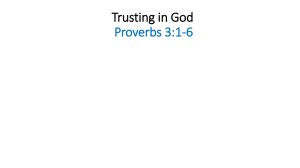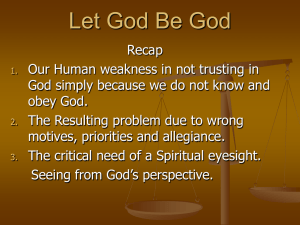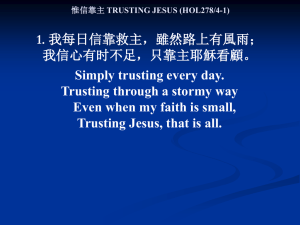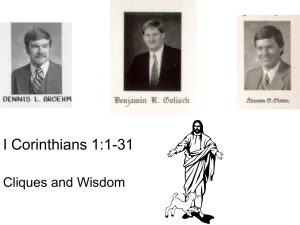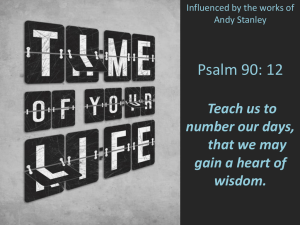James 4.13
advertisement
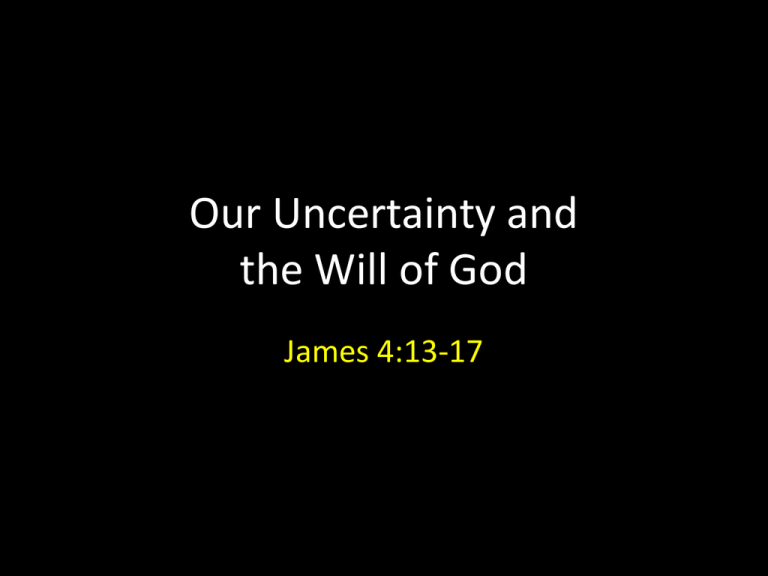
Our Uncertainty and the Will of God James 4:13-17 James 4:13-17 Introduction James 4:13-17 Introduction • Born in 1834, Charles Spurgeon was one of the most popular preachers in London by the age of 21. • What D.L. Moody was to 19th Century America, Spurgeon was to England. • If there was a difference, it was that Moody’s ministry kept him constantly on the road as an itinerate evangelist. James 4:13-17 Introduction • Spurgeon spent his life as a pastor in London, speaking to crowds of thousands several times each week. • These sermons were also published and made their way in written form all around the world. • On Thursday evening, October 16th, 1890, Spurgeon delivered a sermon entitled God’s Will About the Future. • The text was James 4:13-17, our text today. James 4:13-17 Introduction • Some time later, Spurgeon was getting some much-needed rest in the south of France. • That particular sermon was scheduled for distribution on Sunday, February 7, 1892. • One week before that, on January 31, Charles Haddon Spurgeon died, 57 years of age. • Considering the subject matter of the text, the timing of that event was perfect. Life is uncertain. Make the desire to please God your life’s principle driving force. Let’s read the passage: James 4:13-17 James 4:13-17 Outline James 4:13-17 Outline 4:13 4:14 4:15 4:16 4:17 Faith in the future is iffy. Our view of the future is blind. Trusting God with the future is wisdom. Boasting about the future is arrogant. Doing good in the present is required. Life is uncertain. Make the desire to please God your life’s principle driving force. 4:13 Faith in the future is iffy. 4:13 Faith in the future is iffy. • Nothing the people in this verse plan to do is explicitly wrong. They hope to: – Move to a certain city – Spend a year there – Buy and sell – Make a profit • All nice enough, but James addresses the attitude with which they make their plans. 4:13 Faith in the future is iffy. • Another way to state James’s point might be: “Don’t count your chickens before they’re hatched.” • There are two things we can say for sure about the future: 1. God knows what’s going to happen. 2. We don’t. 4:13 Faith in the future is iffy. • Charles Spurgeon’s take on this verse, quoting from that sermon of his, was as follows • “Is it so, O man, that thy life is self governed? Is there not, after all, One greater than thyself? Is there not a higher power that can speed thee or stop thee? If thou dost not know this, thou hast not yet learned the first letter of the alphabet of wisdom.” James 4:13-17 Outline 4:13 Faith in the future is iffy. 4:14 Our view of the future is blind. 4:14 Our view of the future is blind. • Proverbs 27:1 also gives a nice summary of the truth presented here. • There’s an old saying not used much anymore which says, “All men count all men mortal but themselves.” • Our life is like a vapor, like a disappearing cloud, says James. • Here in the Midwest, we know something about passing clouds. Our life is like that. 4:14 Our view of the future is blind. • The Book of Job is full of verses that emphasize the brevity of life. • For example: – Job 7:6 – Job 8:9 – Job 14:1-2 Life is uncertain. Make the desire to please God your life’s principle driving force. James 4:13-17 Outline 4:13 Faith in the future is iffy. 4:14 Our view of the future is blind. 4:15 Trusting God with the future is wisdom. 4:15 Trusting God with the future is wisdom. • It is clearly not wrong to plan. We simply need to remember that before, during and after our planning, God rules over us. • And He always gets the final say. • All our plans should be made and carried out with an attitude of submission to Him. 4:15 Trusting God with the future is wisdom. • “James is not trying to banish planning from our lives, but only that sort of self-sufficient, self-important planning that keeps God for Sunday but looks on Monday to Saturday as mine.” – J. Alec Motyer, The Message of James: The Tests of Faith 4:15 Trusting God with the future is wisdom. • So James reminds us that we should state our plans with at least the mental note of “If God wills, we shall live and ___________.” • This is not a set of magic words, meant to be said superstitiously. Nonetheless, • “If God wills, with God’s help, by God’s grace, with God’s permission” – all of these need to be part of the thought life of every Christian. 4:15 Trusting God with the future is wisdom. • Here is Ralph P. Martin: • “Just as with any Christian teaching, this phrase can become no more than a vain, thoughtless repetition, a kind of fetish. What James is urging here is a conviction (worked out in a congruent lifestyle) that leads one to acknowledge that indeed God is in control of life’s decisions.” 4:15 Trusting God with the future is wisdom. • Paul very clearly did his planning with the will of God in mind: • See Acts 18:19-21 • See also: – Romans 1:10 and 15:32 – 1 Corinthians 4:19 and 16:7 4:15 Trusting God with the future is wisdom. • Some people use the fact of life’s transience as an excuse for doing nothing. • Others use it as justification for squeezing every bit of pleasure out of each and every day – the “Carpe diem,” or “Seize the day” approach to life. • James would have the transience of life lead us to a well-adjusted humility before God. 4:15 Trusting God with the future is wisdom. • For example, sometimes we only need to wait, because not doing so puts us running ahead of God in some matter. • The Israelites in the wilderness had to wait for the cloud to rise up and move before they were allowed to break camp march forward. • Waiting upon the Lord can be part of His strengthening process for us. • Consider Psalm 27:14 and Isaiah 40:31. 4:15 Trusting God with the future is wisdom. • Our lives should radiate an attitude that says, “I will do this or that if, by so doing, I am part of an answer to the prayers of God’s people, ‘Thy will be done on earth as it is in heaven.’” • And since our lives each look so different, outside of the direct word of God in the Scriptures, God’s perfect will for one will not be His will for another. 4:15 Trusting God with the future is wisdom. • Serving God as a builder or mechanic will look very different from serving God in the home or office. • Serving God as a travelling evangelist will look different from serving God in a bank. • The life of a soldier or sailor will look very different from the life of one who serves God in business. 4:15 Trusting God with the future is wisdom. • But all of us can equally serve God and live in the center of His will. • The attitude of our hearts is crucial in our determining of God’s plans. • Moses had it right in Psalm 90:12. Life is uncertain. Make the desire to please God your life’s principle driving force. James 4:13-17 Outline 4:13 Faith in the future is iffy. 4:14 Our view of the future is blind. 4:15 Trusting God with the future is wisdom. 4:16 Boasting about the future is arrogant. 4:16 Boasting about the future is arrogant. • Boasting about the future is really nothing more than talking spiritual smack before the game starts. • But the game of life is far too serious to find ourselves boasting arrogantly. • As fallen beings in a fallen world, we will often be disappointed with the reality of the way things go. 4:16 Boasting about the future is arrogant. • That should instill a little humility. • Further, our motives are unavoidably mixed. • The results of some of our best, most idealistic decisions are predictably flawed. • Where we are at any given time in life is the result of more little decisions and events than we can count. 4:16 Boasting about the future is arrogant. • Thus, the shape of our lives is rarely a simple case of good or evil, black or white. • Some things we’re thrilled with – things which are, perhaps, the result of direct obedience. • Other things, well … • We are new creatures struggling to put that old nature to death. • Should we ever be surprised to find that “old self” resistant to its own execution? James 4:13-17 Outline 4:13 4:14 4:15 4:16 Faith in the future is iffy. Our view of the future is blind. Trusting God with the future is wisdom. Boasting about the future is arrogant. 4:17 Doing good in the present is required. 4:17 Doing good in the present is required. • We normally think of sin as something that we do actively – but sin can just as easily be a kind of “do nothing” passive response. • James sees sin as something more like our default setting. • We sin when we do not decide to do otherwise. 4:17 Doing good in the present is required. • 4:17 Sins can be categorized in two ways: 1. Sins of Commission. – When we actively lie, covet, steal or harm someone else. When we do wrong in any way. 2. Sins of Omission. – When we fail to love as we ought. – When we fail to pay respect when respect is due. – When we fail to adequately care, etc. 4:17 Doing good in the present is required. • 4:17 As we begin to see sin in this light, we begin to also see the firm hold that it has on us – and this too should lead us to humility before God. • The sins of omission shed a sad light on even some of our best accomplishments. 4:17 Doing good in the present is required. • 4:17 Note the word “therefore” in v.17. • This connects the arrogance of v.16 with the sins of omission of v.17. • We may see it as a small thing to exclude God in our day-to-day planning, move forward and more or less ignore Him. • In reality, it is this attitude that leads precisely to a severe lack of doing good – good that we ought to be doing. James 4:13-17 Outline 4:13 4:14 4:15 4:16 4:17 Faith in the future is iffy. Our view of the future is blind. Trusting God with the future is wisdom. Boasting about the future is arrogant. Doing good in the present is required. Life is uncertain. Make the desire to please God your life’s principle driving force. James 4:13-17 Conclusions James 4:13-17 Conclusions • In the example James uses in v.13, it appears that the love of money has subtly driven these men away from God. • Work is more than the means to a paycheck, which then buys us the stuff we want. • God owns our money, and He lets us use it to bring as much glory to Him as we can. • Is God being glorified with your wallet? James 4:13-17 Conclusions • And we should do more than invest our money in God’s work – we need to also invest our lives. • Choosing to live each and every minute for Him is the best way to set our priorities. James 4:13-17 Conclusions • Let’s hear Warren Wiersbe in Be Mature: • “Since life is so brief, we cannot afford merely to “spend our lives”; and we certainly do not want to “waste our lives.” We must invest our lives in those things that are eternal. • “God reveals His will in His Word, and yet most people ignore the Bible. In the Bible, God gives precepts, principles, and promises that can guide us in every area of life.” James 4:13-17 Conclusions • So a good place to start our life’s biggest investment is with a solid foundation in the written Word of God. • The psalmist knew this and recorded it in the first few verses of the book of Psalms. • See Psalm 1:1-3 James 4:13-17 Conclusions • Further, remember that this life is brief. • It’s a vanishing vapor, as James put it. • The primary purpose of life on earth is preparation for the life to come. • See 1 Corinthians 9:24-27. James 4:13-17 Conclusions • Charles Spurgeon was a man who ran his race, and ran with certainty because he stayed true to his life’s goal of pleasing God. • How fitting that the Sunday after he died, his congregation in London received his sermon on this passage: God’s Will About the Future. • As his congregation read these words, Spurgeon was already with Jesus. • He finished his race with joy. James 4:13-17 Conclusions • The following is taken from near the end: • "The time is short." Our opportunities are passing, "For what is your life? It is even a vapour that appeareth for a little time, and then vanisheth away." Be up and doing. Soon we shall be gone. May we never hear the summons to go home while there is anything left undone that we ought to have done for our Lord and Master! James 4:13-17 Outline 4:13 4:14 4:15 4:16 4:17 Faith in the future is iffy. Our view of the future is blind. Trusting God with the future is wisdom. Boasting about the future is arrogant. Doing good in the present is required. Life is uncertain. Make the desire to please God your life’s principle driving force.
